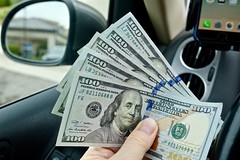The scariest thing many of us have in our minds at one time or another is not having enough money. It doesn’t matter what it’s for, whether it’s real or imagined. Unless we win the lottery (and how many of us have met someone who’s won the lottery?), we always feel like we’re going to need more than we have to do what we want and to feel comfortable and content.

Donald West via Compfight
You want to know a truth? You can feel comfortable about money now, and get on with the life you want to lead. It doesn’t need to be more money, but it can. All it takes is a shifting of your mindset in some unique ways that will help you feel more comfortable about money overall.
We’re going to offer 7 easy ways to get comfortable with money, although one of them is going to be harder than the rest. Let’s start with that one.
1. Budgeting
I know what you’re thinking; we’re pulling a fast one on you because this one is hard. Truthfully, budgeting really isn’t hard once you actually establish one. Getting started can be scary and hard because it’s something you’re not used to, and because most of the time you’re already feeling like you’re in monetary trouble. But once you know where you stand, and the majority of people find they actually have the money to pay all their bills and still be able to get multiple cups of coffee, all feels right with the world.
2. Savings with change
You know what feels worse than not having a lot of money? Not having even a little bit of money to buy something like a pizza. What you need to do is establish a way to put a little bit of money away for those types of occasions.
I know someone who do this by putting all his change in one place, and then once a week going through it and putting it into different containers. One container is the “play” money; another is the “emergency” money; and the third is the “savings” money.
The savings money is the most important money. Once a month he goes through his savings money to see how much of it he can put into rolls and then he puts those rolls into his safe or takes them to the bank for deposit.
This might seem strange because most of us don’t pay attention to our change anymore, but you’d be surprised at how much it can accumulate. Including pennies, he’s sitting on around $400, and that’s only because he cashed out his play money once to go to the casino.
3. Do the same with bills
Do you often have a lot of singles in your wallet? What about five dollar bills? Set up another container and if you have at least 3 of each of these take one and put it in that container. If you have at least 5 then put in two.
What happens is that you forget you have this extra money until something important comes up. Unlike your change, you don’t count this money on a weekly basis. Wait a couple of months before you check it; you’ll be amazed at how much you have. Try not to spend this money unless you have an emergency. You’ll feel comfort in knowing that you have a pile of bills on hand in case you need it.
4. Small charity donations

willian_2000 via Pixabay
You probably get inundated with lots of requests to donate to charity. Even that kind of thing can make you feel pressure when you don’t feel you have enough money to go around.
A simple thing you can do that will help you feel better about yourself is to donate small amounts in unlikely places. For instance, locally Wegmans periodically has these little tickets that allow you to donate as little as $2.99 to the Food Bank. Somehow they’re able to feed more than one person with that little bit of money. Every once in a while let the cashier scan something like that and you’ll feel good that you contributed something to a good cause that not only didn’t break the bank, but won’t result in getting a lot of letters sent to your house asking for more.
5. Go out for breakfast
Many money managers will tell people not to eat out in order to save money. We’re changing this up slightly because if you can’t have a bit of fun then why have money in the first place?
Why are we recommending breakfast instead of dinner? If you have to ask, it means you haven’t seen the difference in prices between breakfast and dinner.
Most local diners that serve breakfast have full meals that are not only relatively low in calories, but are pretty satisfying and tasty for less than five dollars. It’s also hard to mess up breakfast food. Going to dinner and ordering a salad will cost you at least $7. Ordering steak is not only a crap shoot because it might be tender or tough, but it can run you as much as $40 and take longer to get.
If you’re not eating out all the time and want an occasional getaway, nothing says you have to spend a lot of money to eat out. You can even order a cup of coffee if you want and the price will still probably be less than $7 total.
6. Start carrying cash
We’ve become a country that’s addicted to plastic, whether it’s a credit or debit card. It’s convenient and we tend to believe that our money is safer by using them.
There are two fallacies with this logic. One’s ever stolen personal information when the buyer is using cash. Two, studies show that people tend to enjoy things more when they buy them with cash and, as a side benefit, tend to spend less by using more discretion before purchasing things.
Someone I know used to start each week carrying $100, with the intention that’s all that could be spend during the week unless something catastrophic came up. It kept her on point and under control and allowed her to save money for whenever she wanted to make bigger purchases or emergencies. She said she never felt deprived because she got to make the choices and found herself feeling more comfortable by carrying cash rather than using her credit cards, which she left at home unless she needed to buy something specific.
7. Put together a “dream” list
This one should be fun. Sit down and take some time putting together a list of things you’ve been dreaming about that you might want to buy some day. On this list, make sure each item is well over $5,000.
What a list like this does is keeps your mind on the things you’d be willing to save money for, and will get you into a position where you’ll see what’s most important in your life.
Many people don’t notice when they spend $10, but spending $10 3 times a day ends up being $210 a week of unplanned purchases, money you could have used for other things, which includes your dream purchases. A change in mindset has been known to actually help some people save their way to wealth, or at least wealthy habits. It’s a great way to get comfortable with the idea that having money is a good thing.
There’s our list of 7 things; what would you add to this?